Handling ‘Snowmageddon!’
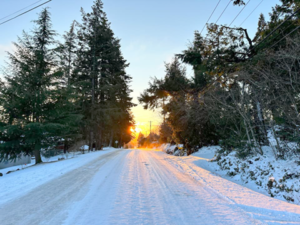
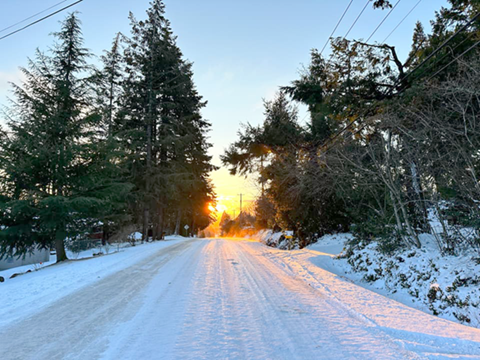
in the Cedar MIll News Group on Facebook
We asked three of the major service providers in our area about the behind-the-scenes activity that takes place as they dealt with the unexpected and amazing snow event in late February. (Is it over yet?)
Roads
For Washington County Land Use & Transportation (LUT), Public Affairs and Communications Manager Melissa De Lyser provided this information.
Road closures: We close roads only if needed on a temporary basis. For example, we might close a road to remove abandoned vehicles that prevent safe snow plowing/sanding operations or if trees or power lines have fallen across the road.
We use a variety of information to evaluate our county-wide weather conditions. In addition to using publicly available information from the National Weather Service, local meteorologists, the Weather Channel, etc., we have a system of weather stations with cameras throughout the County that provide detailed information. These weather stations are part of our integrated information technology system which includes our school flashers, our snow zone flashers and other traffic-related tools.
Towing: LUT Operations and Maintenance and the Sheriff’s Office work cooperatively to determine which vehicles pose a threat to safe travel and road maintenance activities before the Sheriff’s Office initiates the request to have the vehicles towed. Vehicles are subject to immediate towing if they are in the travel lanes, and we cannot get our equipment in to plow and sand the road. Otherwise, the Sheriff’s Office tags abandoned vehicles with a notice to give owners time to retrieve vehicles before they are towed.
Decisions are made usually as a joint venture between the LUT Operations and Maintenance Division and the Sheriff’s Office. Road crew operators and supervisors identify areas of concern and then the Sheriff’s Office take the lead in the actual removal of vehicles once it has been determined that the tow is warranted.
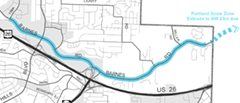
Snow Zones: We designated portions of 175th Avenue, Cornell Road, and Barnes Road as snow zones in fall 2017 due to traffic volumes, road classifications, elevations, slope, and frequent challenging driving conditions during winter weather. Our Operations and Maintenance Division management team decides when to activate snow zones based on feedback from the plow and sand truck operators. The three snow zones are all board adopted, but the actual activation occurs at the staff level based on the actual field conditions.
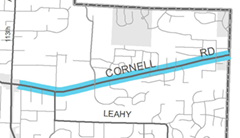
When the snow zone lights are flashing, drivers are required to have traction devices on their vehicles. Establishing snow zones provides an opportunity to warn travelers about these conditions so they have traction devices and will drive cautiously.
[Snow zone violations are normally treated as a “secondary offense,” meaning citations are issued when law enforcement sees travelers disobeying other traffic laws or driving unsafely. Travelers involved in crashes, or who own abandoned vehicles without traction devices, could also receive citations. The citations carry fines of up to $880, plus towing costs.]
For this weather event, we activated all three County snow zones at 6:40 pm on Wednesday, February 22. We don’t have the resources to inspect our 1,300 miles of roadway before and during a storm. Instead, we have priority routes that connect to important resources like hospitals, emergency services and highways.
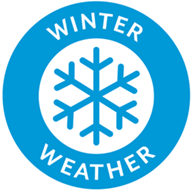
Public notice: There is always an LUT Public Information Officer on call 24/7 for emergency public notifications, including holidays and weekends. We post in English and Spanish to two Twitter accounts, (wc-roads and the County-wide account), NextDoor, two Facebook accounts (County and Condado de Washington), TripCheck, wc-roads.com, and washingtoncountyor.gov. For major events (including snow zone activations) we email media releases to 115 media outlets.
People and equipment: We have six dump trucks with full-size plows and sanders; Four heavy-duty pickup trucks with mini plows and sanders; and three motor graders. If the weather is cold and the roads are dry, we apply magnesium chloride, an anti-icer .This prevents ice from bonding to the pavement. Magnesium chloride doesn’t work if temperatures are above 40 degrees or if the pavement is wet. We apply sand/gravel when conditions warrant.
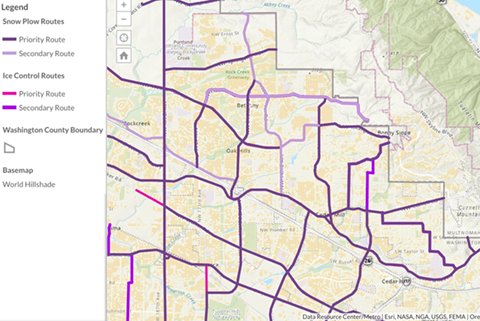
While not all employees are cross trained on all equipment (due to employee position classifications), a significant number can operate most of our equipment. Some equipment, such as our graders, requires special training. Some equipment, such as our dump trucks, requires special licensing. The Operations and Maintenance Division is working to get more staff cross-trained in the core snow response equipment.
While LUT maintenance staff vacancies are at nearly 30%, these vacancies are not related to the budget, and we are working on recruitment plans. There is a shortage of qualified and skilled heavy equipment operators throughout the Portland Metro area. During the late February weather event, we ran two 12-hour shifts, rather than three eight-hour shifts, to accommodate the staffing shortfall.
In addition to basic safety recommendations, please remember: when plowing roads, our crews cannot avoid getting snow on sidewalks/paths that are close to the travel lanes. In addition, when traveling near snowplows, please increase following distance and do not pass. This is for your safety and the safety of other travelers.
Schools
Beaverton School District Public Communications Officer Shellie Bailey-Shah provided this information about public school delays and closures.

Starting around 3:30 am, our transportation administrator and transportation supervisor start driving traditionally problematic areas (think Cooper Mountain, West Hills). They report road conditions to the Deputy Superintendent of Operations & Support and the Superintendent. In addition, they consult with Extended Range Weather Forecasting (ERF, Inc.) plus other neighboring school district superintendents.
The recommendation to delay or close school is based on the ability of the district to operate school buses safely, students and parents/guardians to drive safely, students to walk safely, and employees to get to work safely. The Superintendent makes the call. We consult with Extended Range Weather Forecasting (ERF, Inc.) in addition to getting information from media partners.
I am on call 24/7. Sometimes, we can make the call the night before. At the latest, the decision is made no later than 4:45 am. The Deputy Superintendent calls me with the decision. I then call two staff members in the Communications & Community Involvement Department with the messaging. One person starts posting to our district website and social media accounts. The other person prepares a message on our internal communications platform called ParentSquare. All our parents and staff are connected to ParentSquare. We then send that message as an alert via text, email, and phone call. Finally, I upload our information to FlashAlert, which gets shared with media partners. All this is typically done by 5 am.
If it’s only a snow route announcement, we’ll sometimes wait until 5:15 am to give people a little more time to sleep, as it doesn’t impact all families. [In our area, Bonny Slope, Sato, and Terra Nova are schools that may have BSD transportation canceled because of snow and ice.]
More information is available on the BSD website here.
Walker Garbage
Operations Manager Matt Walker gave us a behind-the-scenes look at this important service provider.
Each day is different in the garbage and recycling world. When we see that inclement weather is on the radar, we begin to monitor news outlets and weather apps to get a good idea about what will happen during the following days. On the morning of a route day, I will drive around some neighborhoods and main roads to see if we will be able to pick them up. At that point, we send out a message to our drivers whether they should come in on time or if we should delay our start for a few hours. If it is really bad on the roads and there are no signs of warming up, that’s when we decide to cancel for the day. Our experience is that this is a tough call because leaving waste is never what we want to do, but our drivers and patron safety is our first priority.
Throughout the evenings and the morning, the Walkers—Jeff, Greg, Kari and me—are in constant communication about what we are seeing both online and in person on the route. After getting on the same page, I make the call if we will have our drivers give it a go or have to cancel for the day.

Public notice: Information regarding our plan during inclement weather can be found on our voicemail each day (503-531-6330), or on the homepage of our website. We have been experimenting with updates on the NextDoor app, and we are working on increasing our forms of communication going forward—whether that be through email, text, or an app. Kari posts updates on the Facebook Cedar Mill News Group page.
A majority of our customers are very understanding, and some even call to warn us that we should not even attempt to access their street or neighborhood. Grumbling customers are always difficult to deal with. In our service-based industry, we want to be able to provide the best service that we can, so it is tough to communicate to angry people that we are unable to do that. We try to defuse the situation by letting them know that we will still be attempting to service them and will not charge extra the next time if we are unable to.
Please be patient! It is always best to leave carts out for a few days after inclement weather. Our drivers care about providing good service but are always cautious because we do not want to damage cars, property, or our equipment. Once again, driver and patron safety are our main priorities!





